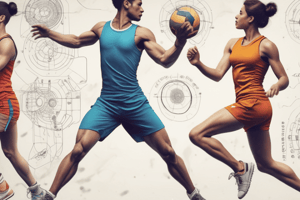Podcast
Questions and Answers
What is one of the major challenges in physical education related to resources?
What is one of the major challenges in physical education related to resources?
Which modern trend focuses on accommodating a variety of student needs in physical education?
Which modern trend focuses on accommodating a variety of student needs in physical education?
What is a critical component for maintaining student engagement in physical education?
What is a critical component for maintaining student engagement in physical education?
What aspect of physical education is increasingly recognized for its benefits beyond physical activity?
What aspect of physical education is increasingly recognized for its benefits beyond physical activity?
Signup and view all the answers
Which trend involves using technology in physical education programs?
Which trend involves using technology in physical education programs?
Signup and view all the answers
What is the primary goal of physical education?
What is the primary goal of physical education?
Signup and view all the answers
Which component is NOT typically emphasized in physical education?
Which component is NOT typically emphasized in physical education?
Signup and view all the answers
How does physical education contribute to mental well-being?
How does physical education contribute to mental well-being?
Signup and view all the answers
What aspect of physical fitness is included in physical education?
What aspect of physical fitness is included in physical education?
Signup and view all the answers
Which social skill is fostered through physical education?
Which social skill is fostered through physical education?
Signup and view all the answers
What potential academic benefit does physical education provide?
What potential academic benefit does physical education provide?
Signup and view all the answers
Which of the following is a health-related topic covered in physical education?
Which of the following is a health-related topic covered in physical education?
Signup and view all the answers
What long-term effect does physical education aim to achieve in students?
What long-term effect does physical education aim to achieve in students?
Signup and view all the answers
Study Notes
Introduction to Physical Education
- Physical education (PE) is a vital part of education, encompassing a wide range of activities that promote physical, social, and cognitive development in individuals.
- It's more than just exercise; it's about learning fundamental movement skills, participating in different sports and activities, and developing a physically active lifestyle.
- PE aims to instill lifelong habits of health-conscious living and equip students with the knowledge and skills related to their well-being.
Components of Physical Education
- Motor skills development: PE focuses on developing fundamental movement skills (e.g., running, jumping, throwing, catching) and more complex skills for various activities. This includes accuracy, speed, coordination, and agility.
- Sports participation and skill acquisition: Instruction in a variety of sports, games, and recreational activities is a core component. This may include team sports, individual sports, and recreational activities.
- Physical fitness: Improving physical fitness, encompassing cardiovascular endurance, muscular strength and endurance, flexibility, and body composition, through planned programs is a necessary aspect of PE.
- Health-related knowledge: PE's scope extends to teaching students about the importance of nutrition, hygiene, injury prevention, and the relationship between physical activity and overall well-being.
- Social and emotional learning: PE promotes teamwork, cooperation, sportsmanship, and conflict resolution through various activities. Students learn to interact with peers and develop crucial social skills.
Benefits of Physical Education
- Physical health: Increased physical fitness, improved cardiovascular health, stronger muscles and bones, reduced risk of chronic diseases.
- Mental well-being: Reduced stress, improved mood, enhanced cognitive function, increased self-esteem, and a sense of accomplishment.
- Social development: Collaboration, teamwork, communication, conflict resolution, leadership, respect for others, and sportsmanship.
- Academic performance: Improved focus, concentration, attention span, and overall cognitive function, leading to better academic results.
- Lifelong physical activity: Developing a passion for physical activity and healthy habits that will last throughout individuals' lives.
Challenges in Physical Education
- Funding and resources: Adequate facilities, equipment, and qualified instructors to support PE programs can be a significant issue in some settings.
- Time constraints: Balancing PE with other subjects or extracurricular activities can make it difficult to dedicate sufficient time to develop and implement effective PE programs.
- Teacher preparation and training: Ensuring teachers have adequate training and support to deliver quality PE instruction is essential.
- Student engagement and motivation: Maintaining student interest in various PE activities can be challenging.
- Diverse needs and abilities: Addressing the diverse needs of students with different physical abilities and learning styles is critical.
Modern Trends in Physical Education
- Inclusive and diverse approaches: Programs increasingly incorporate strategies to accommodate diverse abilities and needs of all students, ensuring that no one is left behind.
- Integration of technology: Utilizing technology to enhance learning, assessment, and program delivery is becoming more common.
- Focus on active play: Recognizing the importance of unstructured play and promoting opportunities for active movement and social interaction among students.
- Health promotion and wellness: Expanding the scope to address a broader range of health-related topics, such as nutrition, mental health, and injury prevention.
- Partnerships and collaboration: Building strong partnerships between schools, communities, and families to support the development of healthy and active lifestyles.
Studying That Suits You
Use AI to generate personalized quizzes and flashcards to suit your learning preferences.
Description
Explore the essential components of Physical Education and how it contributes to health and well-being. This quiz covers aspects such as motor skills development, sports participation, and the promotion of an active lifestyle. Assess your knowledge and understanding of PE's role in education.




